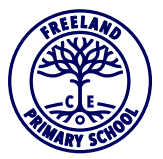EYFS
FOUNDATION STAGE - (EYFS)
What do we do in EYFS?
In EYFS we establish our roots in Freeland Primary School. We believe that children’s early learning experiences deeply affect their future physical, cognitive, emotional and social development. We understand that building secure relationships with children and their families at this early stage is key to understanding how we can get the most out of learning opportunities for each and every child in our setting. We are fully committed to taking the time to understand and follow children’s interests and provide a rich curriculum that supports learning, consolidates and deepens knowledge and ensures that children achieve their next steps. Both our indoor and outdoor provision is carefully planned and demonstrates a thorough knowledge and understanding of the way in which our children learn. We aim to prepare our children to achieve the Early Learning Goals at the end of their foundation stage year. We ensure that all children have made good or better progress from their individual starting points. Our ultimate aim is to prepare our children with the understanding and skills needed for the next stage of their learning journey in KS1. This is so important as we know that; what our children learn in these first years of life will stay with them forever and children’s early education is the best investment we can make in ensuring their future success. By creating an ethos based on ‘Ready, Respectful Safe’, we aim for all children to become confident to challenge themselves and develop a passion for lifelong learning.
How do we educate and nurture in EYFS?
As a team we follow the EYFS curriculum and ensure that the learning opportunities and experiences we provide are clearly linked to both the Prime (Personal, Social and Emotional Development, Communication and Language and Physical Development) and Specific (Literacy, Mathematics, Understanding the World and Expressive Arts) areas of learning. We begin each year by looking at the individual needs of our children and their different starting points and with this information in mind, we are then able to plan a range of broad and balanced learning experiences. We place huge importance on the development of children’s vocabulary. We support children in being able to communicate their thoughts and ideas and explore the meaning of new words. Staff use their knowledge of the Characteristics of Effective Learning to ensure that they plan appropriate activities and organise the provision in a way that demonstrates a clear understanding of the way in which our children and are motivated to learn.
We know that all children are unique, with their own individual interests and it is for this reason that we believe a balance of child and teacher led activities is vital in order for our children to become fully engaged and excited by their learning. We feel that effective provision both indoors and out is based on a clear understanding of what we want our children to learn and how we plan to achieve this. We want our children to be independent in accessing quality play-based experiences that encourage them to notice, question and wonder. Effective interactions between staff and children and regular home/school communication ensures that our curriculum planning and provision is flexible and continuously adapted to meet the needs of all learners and to reflect children’s needs and interests as they continue to develop and grow. We use Tapestry to celebrate children’s achievements, record observations, assess and track children’s progress and to identify their next steps. Regular parent’s meetings and an open door policy ensure that parents are kept up to date with their children’s development and progress and are fully aware of how they can continue to support their children’s learning outside of school. Tapestry offer the opportunity for parents/family members to send in information about their children’s news and achievements outside of school and this provides us with a really well-rounded picture of our children.
What is the impact of our provision?
We make every effort to ensure that all of our children make good or better progress during their time in Foundation Stage. Children who achieve the expected standard within the Early Learning Goals have the knowledge and skills needed to continue to maintain the good progress they have made in Key Stage 1 and beyond. We understand that when assessing children against the Early Learning Goals, there will be many children who are awarded the same level but may be working at differing levels within this range. Effective communication between FS and KS1 staff is therefore crucial to achieve an effective transition for children and to plan accordingly for the next stage of their learning journey. As a team, we carry out regular internal moderation sessions and also ensure that staff attend external meetings and training to ensure that we feel confident with our judgements and that these judgements are consistent with a range of other settings. In addition to regular formative observations, staff input summative data on a termly basis and complete their own data analysis to ensure that our children’s progress is monitored carefully, the impact of actions are evaluated and next steps are identified.
(we have a separate EYFS policy and framework)
